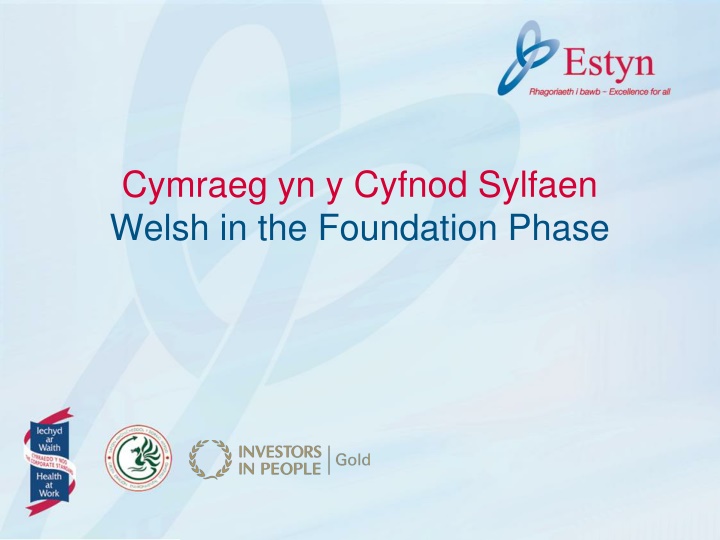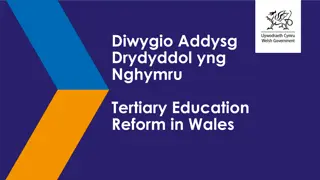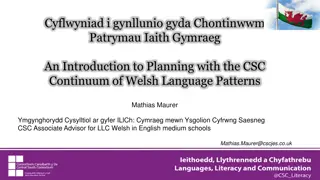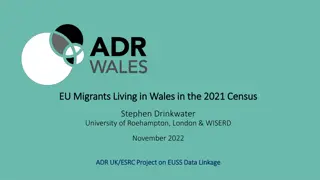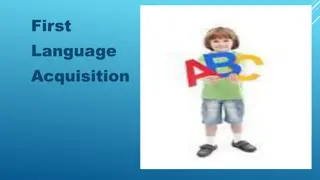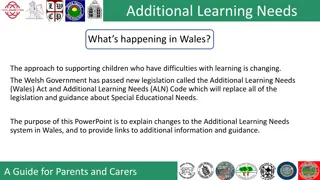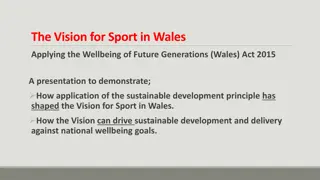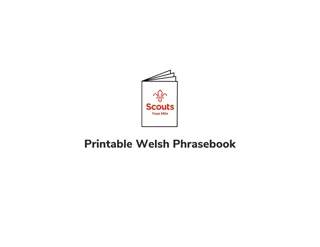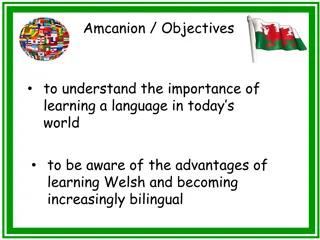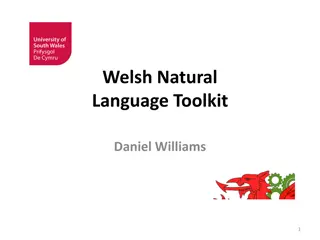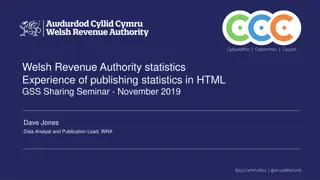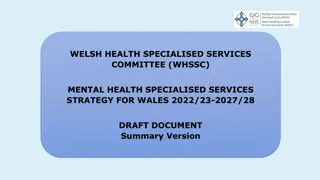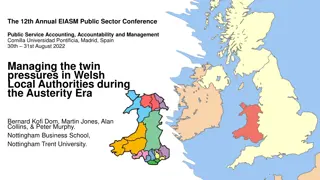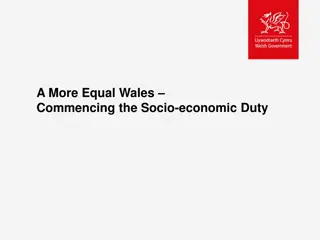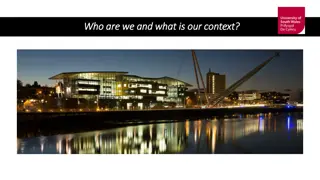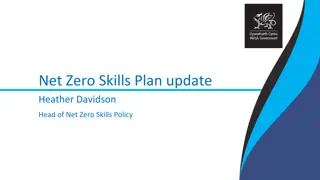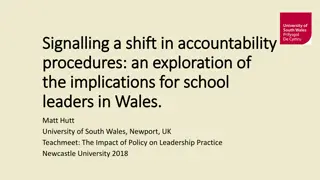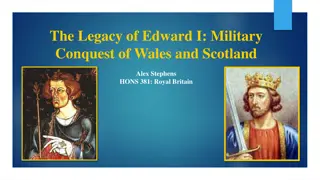Evaluation of Welsh Language Acquisition in Foundation Phase Schools in Wales
The report evaluates the effectiveness of Welsh language acquisition among children in Welsh-medium non-maintained schools across Wales during the Foundation Phase. Findings indicate positive outcomes in language, literacy, and communication skills, with Welsh-speaking and non-Welsh-speaking pupils showing good progress. However, challenges exist in providing equal opportunities for language development based on linguistic backgrounds.
Download Presentation

Please find below an Image/Link to download the presentation.
The content on the website is provided AS IS for your information and personal use only. It may not be sold, licensed, or shared on other websites without obtaining consent from the author.If you encounter any issues during the download, it is possible that the publisher has removed the file from their server.
You are allowed to download the files provided on this website for personal or commercial use, subject to the condition that they are used lawfully. All files are the property of their respective owners.
The content on the website is provided AS IS for your information and personal use only. It may not be sold, licensed, or shared on other websites without obtaining consent from the author.
E N D
Presentation Transcript
Cymraeg yn y Cyfnod Sylfaen Welsh in the Foundation Phase
Cefndir Background Pwrpas yr arolwg hwn yw arfarnu pa mor effeithiol y mae plant yn caffael medrau Cymraeg mewn ysgolion a sectorau nas cynhelir cyfrwng Cymraeg ar draws Cymru. Mae r adroddiad yn amlinellu sut y mae egwyddorion cynllunio a darparu r Cyfnod Sylfaen mewn lleoliadau ac ysgolion yn hwyluso datblygiad y Gymraeg ym mhlith disgyblion o gefndiroedd Cymraeg a di-Gymraeg. The purpose of this survey is to evaluate how effectively children acquire Welsh language skills in Welsh- medium non-maintained schools and sectors across Wales. The report outlines how the planning and provision principles of the Foundation Phase in settings and schools facilitates the development of Welsh among pupils from Welsh speaking and non-Welsh speaking backgrounds.
Prif ganfyddiadau Main findings Yn l asesiadau diwedd Cyfnod Sylfaen 2011-2012, mae tua 86% o ddisgyblion mewn ysgolion cyfrwng-Cymraeg ar draws Cymru n cyflawni yn l y disgwyl ym maes dysgu sgiliau iaith, llythrennedd a chyfathrebu (Cymraeg). Mae hyn yn cymharu n dda chanlyniadau sgiliau iaith, llythrennedd a chyfathrebu (Saesneg) mewn ysgolion cyfrwng Saesneg (84.3%). According to assessments at the end of the Foundation Phase in 2011-2012, about 86% of pupils in Welsh-medium schools across Wales achieve according to expectations in the language, literacy and communication skills (in Welsh) area of learning. This compares well with results for language, literacy and communication skills (in English) in English-medium schools (84.3%).
Prif ganfyddiadau Main findings Yn y mwyafrif o ysgolion a lleoliadau cyfrwng-Cymraeg a arolygwyd, mae safonau siarad a gwrando plant 3-4 oed yn datblygu n dda. Mae safonau cyffredinol disgyblion 4-7 oed yn Gymraeg yn dda. Yn y lleoliadau a r ysgolion hynny sy n darparu ar gyfer disgyblion o gefndiroedd ieithyddol tebyg, mae medrau ieithyddol y disgyblion yn datblygu n gyson. In the majority of Welsh-medium schools and settings that were inspected, children s standards of speaking and listening at 3-4 years of age are developing well. The overall standards of 4-7 year olds in Welsh are good. In those settings and schools that provide for pupils of similar linguistic backgrounds, pupils linguistic skills develop consistently.
Prif ganfyddiadau Main findings Mewn ychydig o r lleoliadau ac ysgolion hynny lle mae cefndir y disgyblion yn gymysg o safbwynt iaith y cartref, mae cynnydd gormod o blant o gartrefi di- Gymraeg yn rhy araf, a chynnydd rhai plant o gartrefi Cymraeg yn cael ei lesteirio. Mewn ychydig o ysgolion, nid yw disgyblion yn cael digon o gyfleoedd i gymhwyso r iaith yn llwyddiannus ar draws ystod o weithgareddau dysgu ac mewn ardaloedd gweithgarwch gwahanol. In a few of the those settings and schools in which pupils backgrounds are mixed in terms of the home language, the progress of too many pupils of non-Welsh speaking homes is too slow, and the progress of some children from Welsh speaking homes is hindered. In a few schools, pupils do not have enough opportunities to apply the language successfully across a range of learning activities and in different activity areas.
Prif ganfyddiadau Main findings Most settings and many schools create a good balance between direct, informal experiences, and focused activities that concentrate specifically on developing language, literacy and communication skills. Mae r rhan fwyaf o leoliadau a llawer o ysgolion yn llwyddo i greu cydbwysedd da rhwng profiadau uniongyrchol, anffurfiol eu naws, a gweithgareddau ffocws sy n canolbwyntio n benodol ar ddatblygu sgiliau iaith, llythrennedd a chyfathrebu. Mae llawer o leoliadau ac ysgolion yn darparu ardaloedd gweithgarwch i drochi plant mewn profiadau a gweithgareddau iaith y tu fewn a thu allan i r adeilad. Many settings and schools provide activity areas in order to immerse children in language experiences and activities inside and outside the building.
Prif ganfyddiadau Main findings Mewn ychydig o ysgolion, nid oes cydbwysedd effeithiol rhwng gweithgareddau ffocws a gweithgarwch mwy anffurfiol, yn arbennig ym Mlynyddoedd 1 a 2. Mewn llawer o leoliadau, a r mwyafrif o ysgolion, mae r ymarferwyr yn cynllunio n ofalus ac yn sicrhau bod y profiadau a r adnoddau sydd ar gael i r plant yn gosod seiliau cadarn i r plant ddatblygu eu medrau iaith. Yn y rhan fwyaf o leoliadau ac ysgolion, mae athrawon yn darparu tasgau a heriau iaith penodol ar gyfer plant. In a few schools, there is not an effective balance between focused activities and more informal activity, especially in Years 1 and 2. In many settings, and the majority of schools, practitioners plan carefully and ensure that experiences and resources that are available for the children establish firm foundations for the children to develop their language skills. In most settings and schools, teachers provide specific language tasks and challenges for children.
Prif ganfyddiadau Main findings Only a few schools set specific language challenges for 4-7 year old pupils across activity areas. Where this happens, many pupils respond positively to them and practise and develop their oral, reading and writing skills in a very effective way. Ychydig o ysgolion sy n gosod heriau iaith penodol ar gyfer disgyblion 4-7 oed ar draws yr ardaloedd gweithgarwch. Lle mae hyn yn digwydd, mae llawer o r disgyblion yn ymateb yn gadarnhaol iddynt ac yn ymarfer a datblygu eu medrau llafar, darllen ac ysgrifennu mewn dull effeithiol iawn. Mae mwyafrif yr athrawon, ymarferwyr a chynorthwywyr yn cynnig modelau iaith da sy n ysgogi plant i gaffael iaith goeth a chywir. The majority of teachers, practitioners and assistants provide good language models, which stimulate children to acquire rich and accurate language.
Prif ganfyddiadau Main findings Mewn lleiafrif o leoliadau nas cynhelir, yn fwyaf arbennig mewn ardaloedd lle nad oes llawer o bobl yn siarad Cymraeg, nid yw safon a chywirdeb iaith ymarferwyr yn ddigon da i gynnig model raenus ar gyfer plant. In a minority of non-maintained settings, and more especially in areas in which not many people speak Welsh, practitioners standard and accuracy of language are not good enough to provide a polished model for children.
Prif ganfyddiadau Main findings Lle mae plant o gartrefi Cymraeg a di-Gymraeg o fewn yr un sefydliad, yn yr arfer orau, mae r athrawon yn cynllunio i sicrhau bod sbardun a chynhaliaeth effeithiol i ddatblygu iaith pob disgybl. Er hynny, mewn gormod o r ysgolion hyn, nid yw athrawon yn cynllunio n ddigon effeithiol i sicrhau bod plant o gefndiroedd ieithyddol gwahanol yn gwneud y cynnydd priodol o u man cychwyn. Where there are children from Welsh speaking and non-Welsh speaking homes in the same institution, in the best practice, teachers plan to ensure that there is effective stimulus and support to develop each pupil s language. However, in too many of these schools, teachers do not plan effectively enough to ensure that children of different linguistic backgrounds make appropriate progress from their starting points.
Prif ganfyddiadau Main findings Mewn ychydig o ysgolion a lleoliadau, nid oes dealltwriaeth gadarn gan athrawon ac ymarferwyr o hanfodion y dull trochi o addysgu. O ganlyniad, nid ydynt yn bwydo a modelu r Gymraeg yn ddigon cadarn i r disgyblion, ac nid yw eu disgwyliadau yn ddigon uchel. Mewn ychydig iawn o achosion, nid yw cynorthwywyr dysgu yn glynu at ddefnyddio r Gymraeg gyda disgyblion o gartrefi di- Gymraeg ac mae hyn yn llesteirio cynnydd. In a few schools and settings, teachers and practitioners do not have a sound understanding of the essentials of the immersion method of teaching. As a result, they do not feed and model Welsh robustly enough to pupils, and their expectations are not high enough. In a very few cases, teaching assistants do not use Welsh with pupils from non-Welsh speaking homes and this hinders progress.
Prif ganfyddiadau Main findings Mewn ychydig o ysgolion, nid yw arweinwyr nac athrawon yn dangos digon o ddealltwriaeth o athroniaeth ganolog y Cyfnod Sylfaen. Oherwydd y flaenoriaeth genedlaethol gyfredol ar ddatblygu llythrennedd, maent yn gweld tensiwn rhwng athroniaeth y Cyfnod Sylfaen a r angen i gynllunio n fwriadus ar gyfer datblygu medrau iaith a llythrennedd. In a few schools, neither leaders nor teachers show enough understanding of the central philosophy of the Foundation Phase. Because of the current national priority on developing literacy, they see a tension between the philosophy of the Foundation Phase and the need to plan purposefully for developing language and literacy skills.
Argymhellion Recommendations Dylai ysgolion a lleoliadau: A1 sicrhau bod cyfleoedd penodol i ddisgyblion ddatblygu a defnyddio eu medrau siarad, darllen ac ysgrifennu ar draws y meysydd dysgu ac yn y gwahanol ardaloedd gweithgarwch; Schools and settings should: R1 ensure that there are specific opportunities for pupils to use their speaking, reading and writing skills across the learning areas and in various activity areas; A2 sicrhau cydbwysedd effeithiol rhwng sesiynau ffurfiol i addysgu ac atgyfnerthu medrau iaith a chyfleoedd anffurfiol i w defnyddio; R2 ensure an effective balance between formal sessions to teach and reinforce language skills and informal opportunities to use them; R3 develop learning activities and opportunities that ensure that pupils from different linguistic backgrounds make appropriate progress from their starting points; A3 datblygu gweithgareddau a chyfleoedd dysgu sy n sicrhau bod disgyblion o gefndiroedd ieithyddol gwahanol yn gwneud cynnydd priodol o u man cychwyn; R4 set clear expectations that will ensure that pupils from all backgrounds use the Welsh language as they follow informal activities, especially at the beginning of the Foundation Phase; A4 gosod disgwyliadau clir fydd yn sicrhau bod disgyblion o bob cefndir yn defnyddio r Gymraeg wrth iddynt ddilyn gweithgareddau anffurfiol, yn arbennig ar ddechrau r Cyfnod Sylfaen;
Argymhellion Recommendations A5 gosod disgwyliadau clir ar gyfer ymarferwyr yngl n defnyddio r Gymraeg yn y Cyfnod Sylfaen fel eu bod yn bwydo a modelu Cymraeg o safon dda i w disgyblion ar draws y meysydd dysgu; R5 set clear expectations for practitioners regarding using Welsh in the Foundation Phase so that they feed and model Welsh of a good standard to their pupils across learning areas; R6 track pupils progress in oral, reading and writing skills consistently throughout the Foundation Phase; and A6 olrhain cynnydd medrau llafar, darllen ac ysgrifennu disgyblion yn gyson ar hyd y Cyfnod Sylfaen; a R7 pay appropriate attention to the quality of provision and standards in the Foundation Phase as part of the self-evaluation and planning improvement processes in schools and settings. A7 rhoi sylw priodol i ansawdd y ddarpariaeth a safonau yn y Cyfnod Sylfaen fel rhan o brosesau hunanarfarnu a chynllunio gwella ysgolion a lleoliadau.
Argymhellion Recommendations Dylai awdurdodau lleol a mudiadau sy n rheoli lleoliadau nas cynhelir: Local authorities and organisations that manage non-maintained settings should: A8 ddarparu cefnogaeth a hyfforddiant i ymarferwyr ar ddulliau trochi o ddysgu iaith ac i roi arweiniad ar sut y gellir datblygu sgiliau iaith, llythrennedd a chyfathrebu (Cymraeg) mewn ffordd sy n gydnaws ag athroniaeth a methodoleg y Cyfnod Sylfaen; R8 provide support and training for practitioners on immersion methods of learning a language and give guidance on how language, literacy and communication skills (in Welsh) can be developed in a way that is compatible with the philosophy and methodology of the Foundation Phase; A9 darparu hyfforddiant a chefnogaeth i ymarferwyr, gan gynnwys cynorthwywyr, i loywi eu Cymraeg, lle bo angen hynny; R9 develop training and support to practitioners, including assistants, to polish their Welsh, where necessary; A10 rhannu arfer dda o ran datblygu sgiliau iaith, llythrennedd a chyfathrebu (Cymraeg) ar draws meysydd dysgu ac ardaloedd gweithgarwch yn y Cyfnod Sylfaen; a R10 share good practice on developing language, literacy and communication skills (in Welsh) across learning areas and activity areas in the Foundation Phase; and .. ..
Argymhellion Recommendations A11 sicrhau bod darpariaeth gefnogol awdurdodau lleol i leoliadau nas cynhelir cyfrwng- Cymraeg ar gael yn Gymraeg R11 ensure that there is supportive local authority provision in Welsh available for Welsh- medium non-maintained settings Dylai Llywodraeth Cymru: The Welsh Government should: A12 sicrhau bod awdurdodau ac ysgolion yn deall y gyd-berthynas rhwng methodoleg ac athroniaeth y Cyfnod Sylfaen a'r Fframwaith Llythrennedd a Rhifedd. R12 ensure that authorities and schools understand the interrelationship between the methodology and philosophy of the Foundation Phase and the Literacy and Numeracy Framework.
Arfer orau Best practice Astudiaeth Achos : Ysgol Feithrin Rhydaman Mewn ardal chwarae r l barhaol, sy n newid yn l them u gweithgarwch yr ysgol ar y pryd yr oedd yr ardal wedi ei threfnu fel ysbyty. Oherwydd cynllunio gofalus i ddarparu gweithgareddau iaith o fewn yr ysbyty : Chwaraeai pob plentyn rolau gwahanol, ac roeddent yn llwyddo i ddefnyddio r eirfa yn effeithiol iawn. Roeddent yn mwynhau r chwarae ac yn yn gallu dwyn i gof a defnyddio geiriau fel penglog , asgwrn , archwilio yn rhwydd ac yn gywir. Roeddent hefyd yn adnabod y geiriau hynny mewn pecyn o gardiau geirfa. Roedd y disgyblion yn ysgrifennu enwau a nodiadau meddygol ar ddarnau o bapur a chlipfyrddau wrth ddilyn y broses o dderbyn claf i r ysbyty, ei archwilio a i drin. Case Study : Ysgol Feithrin Rhydaman In a permanent role-play area, which changes according to the school s activity themes at the time, the area was arranged as a hospital. Because of careful planning to provide language activities inside the hospital : Each child played a different role, and they used the vocabulary very effectively. They enjoyed the play and could recall and use words such as penglog , asgwrn archwilio easily and accurately. They also identified those words in a pack of vocabulary cards. Pupils wrote names and medical notes on pieces of paper and clipboards when following the process of admitting a patient to hospital and examining and treating them.
10 cwestiwn i ddarparwyr 10 questions for providers A yw datblygiad Cymraeg fel iaith yn flaenoriaeth amlwg yng nghynlluniau gwella r lleoliad neu r ysgol? Sut gallwn ni sicrhau bod ein hathrawon a n staff cynorthwyol yn modelu ac yn bwydo iaith dda ar gyfer y plant a r disgyblion? A ydyn ni n sicrhau bod cyfleoedd i ddefnyddio iaith - ar lafar, wrth ddarllen a/neu ysgrifennu - ar draws yr ardaloedd dysgu gwahanol? Is the development of Welsh as a language an obvious priority in the setting or school s improvement plans? How can we ensure that our teachers and support staff model and feed good language to the children and pupils? Do we ensure that there are opportunities to use language orally, when reading and/or writing across the different learning areas?
10 cwestiwn i ddarparwyr 10 questions for providers A ydym yn llwyddo i gael cydbwysedd priodol rhwng gweithgareddau ffurfiol i ddatblygu iaith, a rhoi cyfleoedd da i blant a disgyblion ddefnyddio r iaith honno ar draws y meysydd dysgu? A ydym yn sicrhau bod heriau iaith yn rhan naturiol o n hardaloedd dysgu? A oes disgwyliadau clir ynglyn staff yn defnyddio Cymraeg yn yr ysgol? Do we ensure an appropriate balance between formal activities to develop language and giving children and pupils good opportunities to use that language across learning areas? Do we ensure that language challenges are a natural part of our learning areas? Are there clear expectations regarding staff using Welsh in school?
10 cwestiwn i ddarparwyr 10 questions for providers Sut ydym yn sicrhau bod gwahaniaethu priodol yn ei le i sicrhau nad yw cynnydd plant sy n siarad Cymraeg adref yn cael ei lesteirio? Sut ydym yn olrhain cynnydd disgyblion mewn medrau llafar, darllen ac ysgrifennu? Sut gallwn ni weithredu methodoleg y Cyfnod Sylfaen a datblygu iaith yn llwyddiannus? A yw safonau a darpariaeth y Cyfnod Sylfaen yn cael sylw priodol yn ein prosesau hunanarfarnu? How do we ensure that appropriate differentiation is in place to ensure that the progress of children who speak Welsh at home is not hindered? How do we track pupils progress in oral, reading and writing skills? How can we implement the Foundation Phase methodology and develop language successfully? Do standards and provision in the Foundation Phase receive appropriate attention in our self- evaluation processes?
Gallwch ddarllen yr adroddiad Cymraeg yma. You can read the report in English here.
Cwestiynau........ Questions
